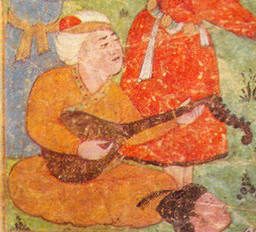The views expressed in our content reflect individual perspectives and do not represent the authoritative views of the Baha'i Faith.
Baha’i musicians and musical artists attempt to adhere to the most profound expression that emerged from the ancient muses, from which the actual name, Music, has come.
We, the musicians of the Baha’i Faith, learn from the Baha’i teachings that we have a deep spiritual responsibility to retain and advance the finest artistic expression that can be achieved, by committing ourselves to become masters of the complete lexicon of what great music can and should be. Instead of slavishly following what has been done before, or what can be accomplished quickly in today’s materialistic, instantaneous-gratification culture, Baha’i musicians try to become the masters of their disciplines, so that our crystal clear statements about this unique new Day cannot be wholly identified with any other expression of music.
Various expressions of “music” reflect the popular cultures of today, and Baha’is try not to simply ape those trends. Doing so, especially by utilizing some of the degraded language, forms and styles available today, runs the risk of denigrating the teachings and the words of the Baha’i Faith and demeaning their power and meaning.
Accommodating or making music that follows the current trends of commercial popularity—always in a state of flux, moving on to the Next Big Thing—is really the antithesis of what Baha’is want to do for the future of humanity. Of course, all music is not the same, from culture to culture, but if you talk to people, particularly the artists, about what is taking place musically in each of those cultures, you will hear this same critical evaluation in each of their respective cultural environments. We have a spiritual and moral responsibility not to prostitute our art, and to lead the way toward a more enlightening exposition of our craft.

Illustration of Barbud
That brings immediately to mind the subject, for everybody to consider, of the power of music.
Have you read Abdu’l-Baha’s story about Barbud? He was a renowned singer, player and inventor of many ancient musical instruments who lived at the court of Khosrow-Parviz of the Sasani Persian dynasty sometime around 600 A.D. Let me share the story with you, because it pertains to one of the most important aspects of music—its unearthly power:
Among the most renowned musicians of Persia was one named Barbud, who, whenever a great question had been pleaded for at the court of the King, and the Ministry had failed to persuade the King, they would at once refer the matter to Barbud, whereupon he would go with his instrument to the court and play the most appropriate and touching music, the end at once attained, because the King was immediately affected by the touching musical melodies, certain feelings of generosity would swell up in his heart, and he would give way. – Abdu’l-Baha, translated from a Persian tablet to an individual Baha’i.
No, this is not a fairy tale to be told to children; this was a real person that Abdu’l-Baha knew of, and I share the story to give you an insight into the power of music.
Music has power. It really does have the power to soothe the heart of the savage beast, like the popular saying goes. As musicians, and as listeners, we can use that power positively or negatively.
So let me recognize the many artists who have shared their comments with me over the years, expressing their horror of what has been happening in their respective disciplines—the denigration of the quality and the soul spirit that had, at one time, been the hallmark of all of the arts. All of us who have been here long enough recognize this phenomena, and have seen that negative result take place over time.
But today, Baha’is believe that we have all received guidance for the re-elevation and the return to quality musical expression, by the most powerful and meaningful source of everything that exists.
Just think about that for one minute. Another prophet of God has come. With all of the books now opened for everyone, with a new message of unity and human oneness, Baha’u’llah—the one all of the former prophets have promised—has appeared.
What more do we need to let us know what age this is? What more must we experience to begin to ignore the old world, as it crumbles into the abyss of arrogance and hatred, and for each and every one of us to begin to bring to light the beauty and magnificence of this age of fulfillment? We can do it, especially by becoming the potential artist that lives inside all of us, and committing ourselves to achieving that exalted knowledge in the excellence of our discipline and expressing, in the language of our art, what the Baha’i Revelation promises humankind.
Music does not come from us. It comes through us, from the Creator. That is another justification for striving for the mastery of music, without hesitation or reservation. Accepting less than excellence as our goal restricts our ability to adequately express what the Creator is trying to say through our respective musical voices. However—I truly believe that the mastery of music comes not just from technical proficiency, but from depth of musical sensibility and expressiveness.

















Comments
Sign in or create an account
Continue with Facebookor